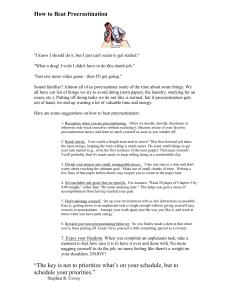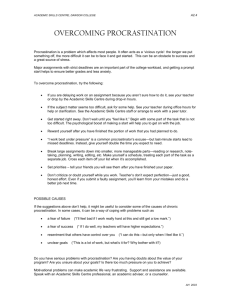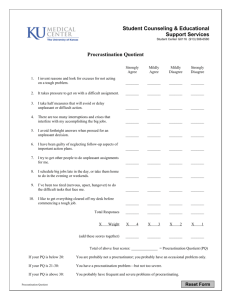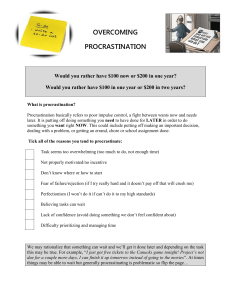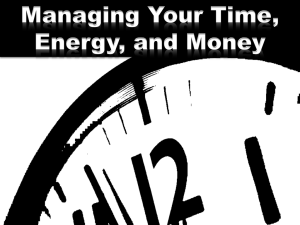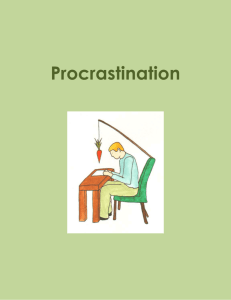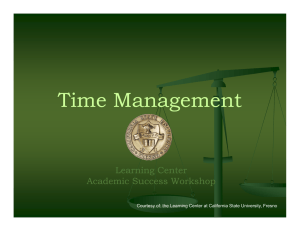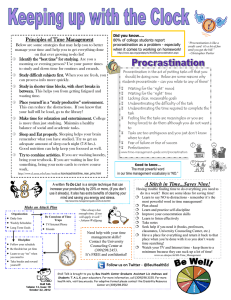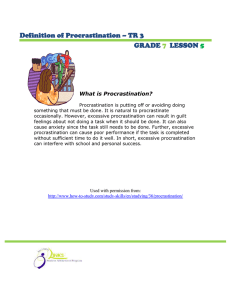Procrastination & The College Student HOW TO BEAT PROCRASTINATION
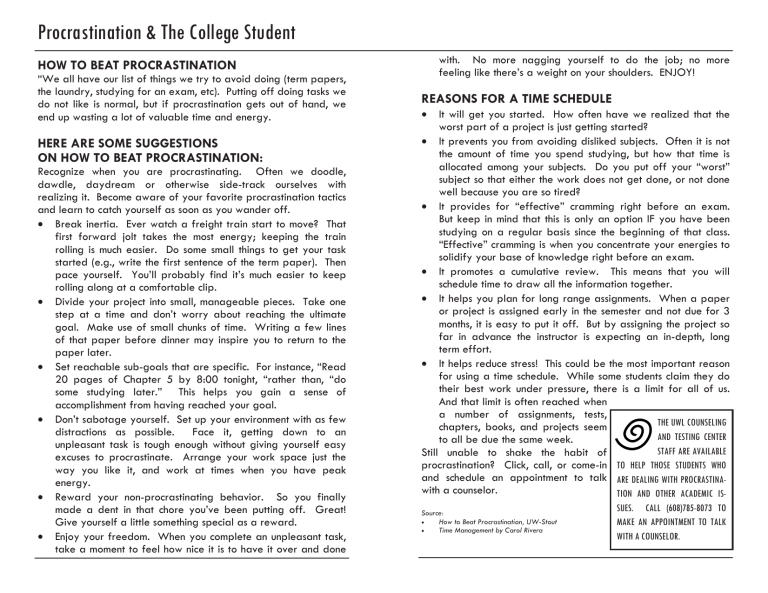
Procrastination & The College Student
HOW TO BEAT PROCRASTINATION
“We all have our list of things we try to avoid doing (term papers, the laundry, studying for an exam, etc). Putting off doing tasks we do not like is normal, but if procrastination gets out of hand, we end up wasting a lot of valuable time and energy.
HERE ARE SOME SUGGESTIONS
ON HOW TO BEAT PROCRASTINATION:
Recognize when you are procrastinating. Often we doodle, dawdle, daydream or otherwise side-track ourselves with realizing it. Become aware of your favorite procrastination tactics and learn to catch yourself as soon as you wander off.
• Break inertia. Ever watch a freight train start to move? That first forward jolt takes the most energy; keeping the train rolling is much easier. Do some small things to get your task started (e.g., write the first sentence of the term paper). Then pace yourself. You’ll probably find it’s much easier to keep rolling along at a comfortable clip.
• Divide your project into small, manageable pieces. Take one step at a time and don’t worry about reaching the ultimate goal. Make use of small chunks of time. Writing a few lines of that paper before dinner may inspire you to return to the paper later.
• Set reachable sub-goals that are specific. For instance, “Read
20 pages of Chapter 5 by 8:00 tonight, “rather than, “do some studying later.” This helps you gain a sense of accomplishment from having reached your goal.
• Don’t sabotage yourself. Set up your environment with as few distractions as possible. Face it, getting down to an unpleasant task is tough enough without giving yourself easy excuses to procrastinate. Arrange your work space just the way you like it, and work at times when you have peak energy.
• Reward your non-procrastinating behavior. So you finally made a dent in that chore you’ve been putting off. Great!
Give yourself a little something special as a reward.
• Enjoy your freedom. When you complete an unpleasant task, take a moment to feel how nice it is to have it over and done with. No more nagging yourself to do the job; no more feeling like there’s a weight on your shoulders. ENJOY!
REASONS FOR A TIME SCHEDULE
• It will get you started. How often have we realized that the worst part of a project is just getting started?
• It prevents you from avoiding disliked subjects. Often it is not the amount of time you spend studying, but how that time is allocated among your subjects. Do you put off your “worst” subject so that either the work does not get done, or not done well because you are so tired?
• It provides for “effective” cramming right before an exam.
But keep in mind that this is only an option IF you have been studying on a regular basis since the beginning of that class.
“Effective” cramming is when you concentrate your energies to solidify your base of knowledge right before an exam.
• It promotes a cumulative review. This means that you will schedule time to draw all the information together.
• It helps you plan for long range assignments. When a paper or project is assigned early in the semester and not due for 3 months, it is easy to put it off. But by assigning the project so far in advance the instructor is expecting an in-depth, long term effort.
• It helps reduce stress! This could be the most important reason for using a time schedule. While some students claim they do their best work under pressure, there is a limit for all of us.
And that limit is often reached when a number of assignments, tests,
THE UWL COUNSELING chapters, books, and projects seem to all be due the same week.
Still unable to shake the habit of procrastination? Click, call, or come-in and schedule an appointment to talk with a counselor.
•
Source:
• How to Beat Procrastination, UW-Stout
Time Management by Carol Rivera
AND TESTING CENTER
STAFF ARE AVAILABLE
TO HELP THOSE STUDENTS WHO
ARE DEALING WITH PROCRASTINA-
TION AND OTHER ACADEMIC IS-
SUES. CALL (608)785-8073 TO
MAKE AN APPOINTMENT TO TALK
WITH A COUNSELOR.
